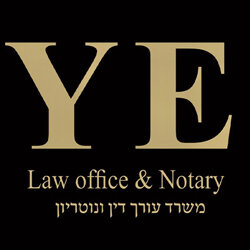Best Landlord & Tenant Lawyers in Israel
Share your needs with us, get contacted by law firms.
Free. Takes 2 min.
Free Guide to Hiring a Real Estate Lawyer
Or refine your search by selecting a city:
List of the best lawyers in Israel
About Landlord & Tenant Law in Israel
Landlord and tenant law in Israel is primarily governed by the Israeli Tenant Protection Law, 1972, and the Contracts Law, 1973. These laws aim to balance the interests of both landlords and tenants, ensuring that both parties' rights and obligations are respected. The legal framework covers various aspects, including lease agreements, tenant rights, landlord obligations, deposit regulations, rent control measures, and procedures for eviction. With an evolving real estate market, these laws help maintain order and fairness within the rental sector.
Why You May Need a Lawyer
Seeking legal assistance in landlord and tenant matters may be necessary in several situations. These include disputes over lease agreements, disagreements regarding maintenance responsibilities, issues related to rent control or adjustments, understanding eviction processes, and handling cases of unlawful eviction. Additionally, landlords might face challenges with tenant behavior, while tenants may experience issues such as lack of repair, privacy violations, or unjustified rent increases. A lawyer can provide legal guidance, represent you in court if necessary, and help navigate the complex legal landscape to protect your rights and interests.
Local Laws Overview
Key aspects of local laws relevant to landlords and tenants in Israel include:
- Lease Agreements: Agreements must be in writing, clearly outlining the terms, including duration, rent amount, and any specific rules or conditions.
- Rent Control: Certain properties may be subject to rent control laws, restricting the amount and frequency of rental increases.
- Security Deposits: Regulations dictate how deposits should be handled, including acceptable amounts and conditions for return.
- Maintenance and Repairs: Landlords are typically responsible for property maintenance, while tenants should report any issues promptly.
- Evictions: Landlords must follow a legal process, which typically requires a court order, to evict a tenant.
- Tenant Rights: Tenants are entitled to quiet enjoyment and privacy, with certain protections against harassment or discrimination.
Frequently Asked Questions
What should be included in a lease agreement?
A lease agreement should include the rental amount, duration, property description, responsibilities regarding maintenance, payment terms, and any specific rules or provisions agreed upon by both parties.
Can rent be increased during the lease term?
Unless otherwise stated in the lease agreement, rent cannot be increased during the lease term. Any increases can usually occur only at the end of a lease term and must comply with any applicable rent control laws.
Who is responsible for repairs?
Typically, landlords are responsible for major repairs and ensuring the property is habitable, while tenants should handle minor repairs and report significant issues to the landlord.
Are landlords allowed to enter the property without notice?
Landlords must generally provide notice, except in emergencies, when entering a tenant's property and should respect the tenant's right to privacy.
What can a tenant do if the landlord refuses to make repairs?
Tenants can notify the landlord in writing, request repairs, and, if necessary, seek legal assistance or file a complaint with local authorities if repairs are not made in a timely manner.
How can a tenant contest an eviction?
If a tenant receives an eviction notice, they can contest it in court. It is advised to seek legal assistance to understand their rights and defend against any unlawful eviction.
How much notice must a tenant give before vacating?
The notice period required for vacating is usually stated in the lease agreement. In general, a 30-day notice is common practice, but this can vary.
Do tenants have any rights if the property is sold?
Tenants retain their rights under the lease agreement, and any new property owner would assume the obligations of the previous landlord.
Are tenants liable for property damage?
Tenants can be held responsible for damages beyond normal wear and tear. Such liabilities should be detailed in the lease agreement.
What can be done if a security deposit is not returned?
If a rightful security deposit is not returned, tenants can issue a written demand for its return and potentially pursue small claims court if it’s unjustly withheld.
Additional Resources
Several resources are available for landlords and tenants seeking legal advice or information in Israel:
- Ministry of Justice: Offers general guidance on tenants' and landlords' rights.
- Legal Clinics in Universities: Provide free or low-cost legal advice.
- Local Municipalities: Often have housing departments that provide resources for resolving disputes.
- Israeli Bar Association: Can refer to qualified attorneys with experience in property law.
Next Steps
If you require legal assistance with a landlord and tenant matter, it is advisable to first understand your specific situation and the applicable laws. Gather all relevant documentation, such as the lease agreement and any correspondence with the other party. Consider consulting a lawyer who specializes in property law. They can provide tailored advice, mediate disputes, or represent you in court to protect your rights effectively. Using resources like legal aid services or consulting with the Israeli Bar Association can be a beneficial first step in finding the appropriate legal support.
Lawzana helps you find the best lawyers and law firms in Israel through a curated and pre-screened list of qualified legal professionals. Our platform offers rankings and detailed profiles of attorneys and law firms, allowing you to compare based on practice areas, including Landlord & Tenant, experience, and client feedback.
Each profile includes a description of the firm's areas of practice, client reviews, team members and partners, year of establishment, spoken languages, office locations, contact information, social media presence, and any published articles or resources. Most firms on our platform speak English and are experienced in both local and international legal matters.
Get a quote from top-rated law firms in Israel — quickly, securely, and without unnecessary hassle.
Disclaimer:
The information provided on this page is for general informational purposes only and does not constitute legal advice. While we strive to ensure the accuracy and relevance of the content, legal information may change over time, and interpretations of the law can vary. You should always consult with a qualified legal professional for advice specific to your situation.
We disclaim all liability for actions taken or not taken based on the content of this page. If you believe any information is incorrect or outdated, please contact us, and we will review and update it where appropriate.
Browse landlord & tenant law firms by city in Israel
Refine your search by selecting a city.













